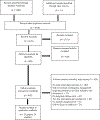Long-term efficacy of contingency management treatment based on objective indicators of abstinence from illicit substance use up to 1 year following treatment: A meta-analysis
- PMID: 33507776
- PMCID: PMC8034391
- DOI: 10.1037/ccp0000552
Long-term efficacy of contingency management treatment based on objective indicators of abstinence from illicit substance use up to 1 year following treatment: A meta-analysis
Abstract
Objective: Contingency management (CM) is often criticized for limited long-term impact. This meta-analysis focused on objective indices of drug use (i.e., urine toxicology) to examine the effects of CM on illicit substance use up to 1 year following treatment.
Method: Analyses included randomized trials (k = 23) of CM for stimulant, opioid, or polysubstance use disorders that reported outcomes up to 1 year after the incentive delivery had ended. Using random effects models, odds ratios (OR) were calculated for the likelihood of abstinence. Metaregressions and subgroup analyses explored how parameters of CM treatment, namely escalation, frequency, immediacy, and magnitude of reinforcers, moderated outcomes.
Results: The overall likelihood of abstinence at the long-term follow-up among participants who received CM versus a comparison treatment (nearly half of which were community-based comprehensive therapies or protocol-based specific therapies) was OR = 1.22, 95% confidence interval [1.01, 1.44], with low to moderate heterogeneity (I² = 36.68). Among 18 moderators, longer length of active treatment was found to significantly improve long-term abstinence.
Conclusions: CM showed long-term benefit in reducing objective indices of drug use, above and beyond other active, evidence-based treatments (e.g., cognitive-behavioral therapy, 12-step facilitation) and community-based intensive outpatient treatment. These data suggest that policymakers and insurers should support and cover costs for CM, which is the focus of hundreds of studies demonstrating its short-term efficacy and, now, additional data supporting its long-term efficacy. (PsycInfo Database Record (c) 2021 APA, all rights reserved).
Figures


References
-
- Ainscough TS, McNeill A, Strang J, Calder R, & Brose LS (2017). Contingency management interventions for non-prescribed drug use during treatment for opiate addiction: A systematic review and meta-analysis. Drug and Alcohol Dependence, 178, 318–339. 10.1016/j.drugalcdep.2017.05.028 - DOI - PMC - PubMed
Publication types
MeSH terms
Grants and funding
LinkOut - more resources
Full Text Sources
Other Literature Sources
Medical

